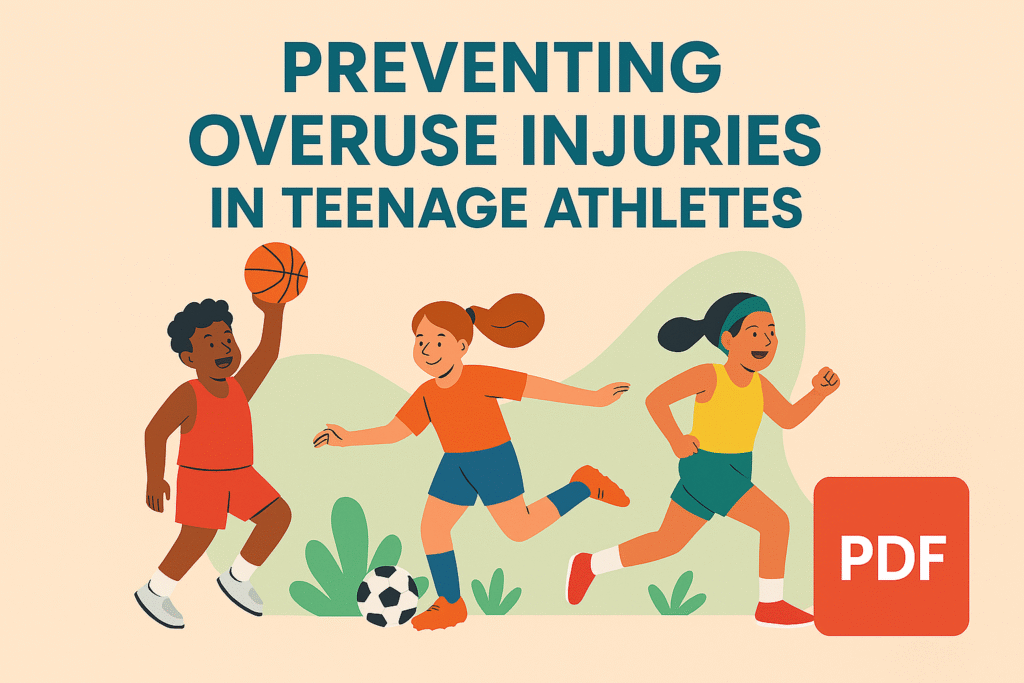Teenage athletes are often full of drive, motivation, and determination to improve their game. Whether it’s chasing a soccer ball on the weekend, swimming laps before sunrise, or pushing limits at practice, their commitment is inspiring. But beneath that dedication lies a growing concern that many parents, coaches, and even teens overlook Preventing Overuse Injuries in Teenage Athletes
These injuries don’t happen overnight. They build quietly, little by little, as the body is pushed without adequate time to recover. And unlike a sudden fracture or sprain, overuse injuries creep in subtly sometimes going unnoticed until real damage is done.
What Are Overuse Injuries?
Overuse injuries occur when muscles, tendons, bones, or joints are repeatedly stressed without proper rest or conditioning. Common examples in teens include:
- Shin splints
- Stress fractures
- Tendinitis (like jumper’s knee or tennis elbow)
- Little League shoulder or elbow
- Sever’s disease (heel pain in growing athletes)
These aren’t rare. In fact, they make up nearly 50% of all sports injuries in children and adolescents, according to pediatric health studies.
Why Are Teens More Vulnerable?
Teenagers’ bodies are still growing. Their growth plates (soft areas near the ends of long bones) are weaker and more prone to injury than mature bone. When combined with intense training schedules, pressure to perform, and limited rest, it becomes a perfect storm for physical burnout.
Many young athletes are also specializing in one sport year round, which increases repetitive motion on specific body parts without the benefit of cross training or muscle balance.
Signs Parents and Coaches Shouldn’t Ignore
Sometimes, a teen may not want to speak up about their pain for fear of disappointing a coach or losing playing time. But these signs are worth your attention:
- Pain that starts gradually and worsens with activity
- Swelling in joints or limbs
- Changes in performance or enthusiasm
- Persistent fatigue or irritability
- Favoring one side of the body or limping
Listening closely both to their words and their body language can make a real difference.

Smart Strategies to Prevent Overuse Injuries
Here’s the good news: most overuse injuries are preventable. With the right habits and awareness, your teen can thrive in sports while protecting their long term health.
🟢 1. Encourage Rest Days
Rest isn’t laziness it’s growth. A minimum of one full rest day per week is essential for tissue recovery and mental recharge.
🟢 2. Emphasize Variety
If possible, promote multi sport participation or at least encourage cross training to balance different muscle groups. For example, swimmers can benefit from yoga or resistance training.
🟢 3. Focus on Proper Technique
Skill development matters more than intensity. Poor form places extra stress on joints and muscles, so consistent coaching and feedback are key especially in fast paced environments.
🟢 4. Make Warm Ups and Cool Downs Non-Negotiable
Stretching, dynamic warm ups, and post exercise recovery sessions reduce the risk of strain. It also helps build body awareness.
🟢 5. Monitor Growth Spurts
During rapid growth phases, teens are more susceptible to injury. Pay extra attention during these periods and adjust training intensity as needed.
🟢 6. Open Communication Is Everything
Let your teen know it’s okay to speak up about discomfort or fatigue. Foster an environment where performance doesn’t come at the cost of pain.
Supporting a Healthy Athletic Journey
The goal isn’t to hold teens back it’s to help them go farther, safer, and stronger. As parents, coaches, and supporters, we play a vital role in creating a sports culture that values sustainability over short term wins.
When we support recovery, prioritize mental and emotional health, and lead with care, we allow young athletes to enjoy their sport with confidence and fewer injuries.
We’ve written this blog for Preventing Overuse Injuries in Teenage Athletes, which includes:
- A breakdown of sport specific overuse injuries
- Practical exercises and recovery routines
- Tips for teen athletes, parents, and coaches
- Mental health strategies for managing pressure
Visit more blogs for your daily life problems here

